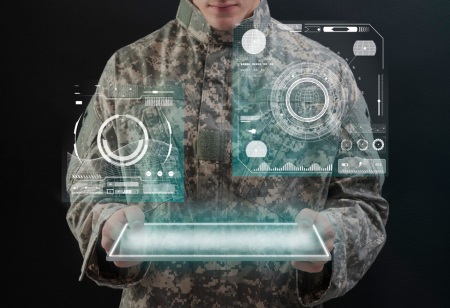
The global landscape of defence technology is in a constant state of flux, driven by a relentless pursuit of innovation and the need to address contemporary security threats. In today's world, defence sectors worldwide are leaning heavily on technology to provide enhanced performance and security, and the future holds the potential to unlock unimagined possibilities. Breakthroughs and innovations are surfacing regularly, redefining the nature of warfare and the principles of defence. This ever-changing landscape is marked by several key trends, including the rising influence of Artificial Intelligence (AI), the importance of cyber defence mechanisms, the exploration of space defence innovations, the evolution of autonomous vehicles, and the promise of quantum computing. Amidst this dynamic environment, Bendtech Defence emerges as a key player, contributing to the transformation of the defence sector and redefining how we approach security on a global scale.
Artificial Intelligence in Warfare
One of the most prominent and transformative trends in defence technology is the increasing role of Artificial Intelligence (AI). AI offers advanced solutions that can significantly impact the way military operations are conducted. Its applications are multifaceted, ranging from data analysis to autonomous decision-making processes, and they have the potential to revolutionize defence strategies.
AI can efficiently parse through vast volumes of data with speed and precision, providing military personnel with real-time intelligence and insights. This ability to process information swiftly and accurately strengthens intelligence operations, enabling decision-makers to respond rapidly to threats and changing situations. For example, AI can sift through intercepted communications, monitor social media, and analyze data from sensors to identify potential threats and vulnerabilities. It can also help predict enemy actions and intentions by analyzing historical data and patterns.
Cyber Defence Mechanisms
In addition to traditional warfare, the defence sector must confront the growing threat of cyber-attacks with equal importance. The need for advanced cyber defence mechanisms arises from the escalating instances of cyber threats and hacking attempts on a global scale. In today's interconnected world, military operations, communication, and intelligence gathering heavily depend on digital technologies, making them susceptible to cyber threats.
Advanced cyber defence mechanisms are characterized by their ability to detect and neutralize threats in real-time. These systems employ sophisticated algorithms and AI-driven solutions to recognize unusual patterns or behaviors that may indicate a cyber-attack. They can then respond by isolating compromised systems, blocking malicious code, or even launching countermeasures to thwart the attack.
Space Defence Innovations
Space has become the new frontier for defence innovation, and the future promises a stronger emphasis on technologies that offer reliable space defence solutions. Satellites have already proven to be crucial assets in defence, providing persistent and always-on surveillance capabilities from strategic positions in orbit. These capabilities enable military forces to monitor potential threats, gather intelligence, and communicate across vast distances.
Satellite-based technologies offer a broad spectrum of applications in defence, ranging from reconnaissance and surveillance to secure communication and navigation. Space-based defence systems are designed to ensure that these critical assets remain safe from potential attacks or interference, whether from rival nations or non-state actors.
The Evolution of Autonomous Vehicles
The deployment of autonomous vehicles in the defence sector represents a paradigm shift in military operations. Unmanned Aerial Vehicles (UAVs), Unmanned Ground Vehicles (UGVs), and Autonomous Underwater Vehicles (AUVs) are being increasingly utilized in situations that are deemed too risky for human intervention. These autonomous systems are equipped with state-of-the-art sensors, communication technologies, and AI algorithms, enabling them to carry out intricate missions in hostile and hazardous environments.
Unmanned systems offer several advantages, including reducing the risk to human lives and enhancing mission effectiveness. UAVs, for instance, can conduct reconnaissance, surveillance, and even offensive operations without putting human pilots at risk. Similarly, UGVs can navigate through challenging terrains and defuse explosives, while AUVs can perform underwater exploration, mine detection, and maintenance tasks with great precision.
Quantum Computing and Defence
Quantum computing, though still an emerging technology, holds immense potential for application in defence technology. Quantum computers operate on principles fundamentally different from classical computers, allowing them to solve certain problems much faster than traditional machines. The unique computational capabilities of quantum computers could have a profound impact on defence technology in several ways.
One of the most promising applications of quantum computing in defence is in the field of cryptography. Quantum computers have the potential to crack currently unbreakable encryption methods, which could jeopardize the security of sensitive military communications and classified information.
Challenges and Ethical Considerations
While the future of defence technology is promising, it also comes with several challenges and ethical considerations. As technology advances, new vulnerabilities emerge, and defence mechanisms must adapt to counter evolving threats. This adaptability necessitates significant investments in research and development to stay ahead of potential adversaries.
In the realm of cyber defence, the challenge lies in staying ahead of cybercriminals and hostile state actors who continuously develop new techniques and exploits. The cat-and-mouse game of cybersecurity necessitates constant vigilance, rapid response, and collaboration between governments, industries, and international organizations.
We use cookies to ensure you get the best experience on our website. Read more...